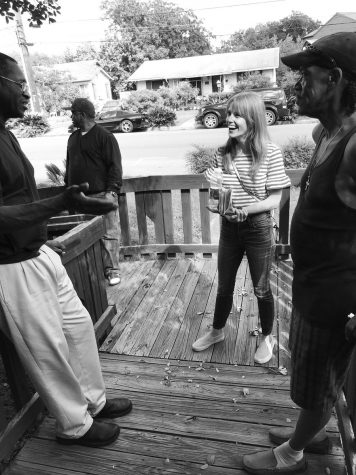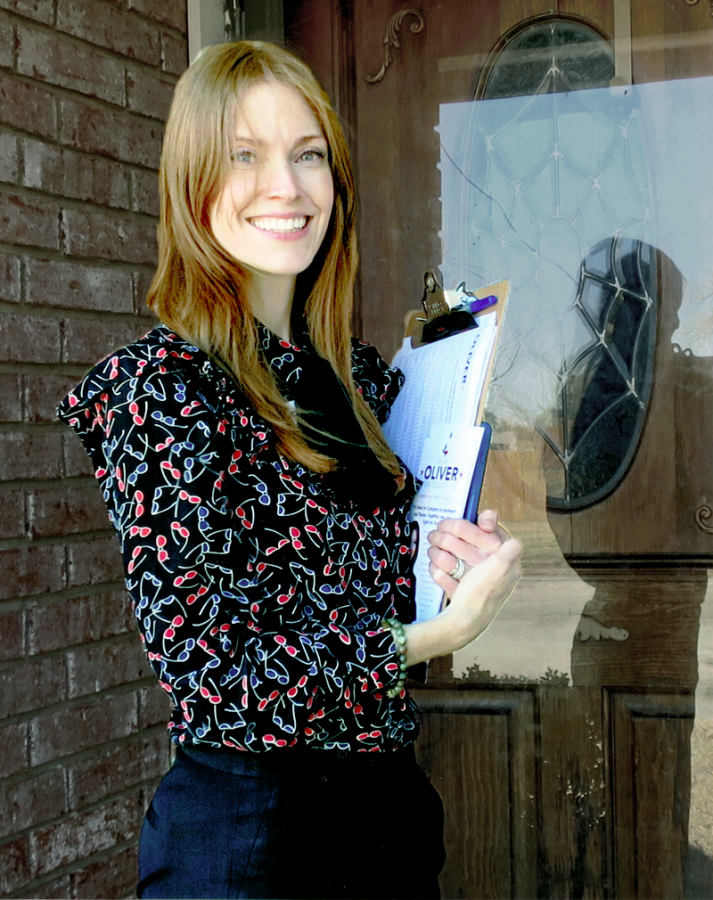Julie Oliver leads ladies in politics
Julie Oliver, candidate for the 25th Congressional District, recently spoke to a Tarleton State University student and realized some college students are not aware of the issues at stake this election. Oliver reached out and asked The JTAC for the opportunity to engage Tarleton students, to inform them of her positions on critical issues that directly impact their lives and to strongly encourage them to vote.
The 25th District, which Oliver is seeking to represent, stretches from southern Tarrant County to northern Travis County and includes Erath County. Her opponent is incumbent Roger William. Two weeks ago Oliver sat for an interview with the JTAC to discuss issues, but most importantly, to try to engage Tarleton students in the upcoming election.
Oliver decided to get involved in July 2017, as the U.S. Congress was voting to repeal the Affordable Care Act [John McCain famously turned his thumb down ending the repeal].
“My son has serious health issues so it was actually because of him… I told my husband I have to step up,” Oliver said.
She never had political aspirations, but strongly felt that Congress was trying to take healthcare away from millions of people. Oliver chose to become involved as a candidate, but strongly feels that all people especially young people, must have a voice in our political process – a voice they can and must use by voting.
“Sometimes it seems that younger people are disengaged… thinking ‘well this doesn’t affect me.’ Well it does. There are so many issues at the local level, state and federal level that do affect their day-to-day lives,” Oliver said.

When speaking, particularly to young people, Oliver shares her personal story. It is one of forward-moving perseverance. She dropped out of high school at 17 and was a homeless teenager; living in abandoned buildings and shelters. She returned home when she became pregnant and gave birth to her daughter one week before graduating from high school.
Deciding whether to go to college or a trade school can be a major burden for students. For most people it is a decision on whether to go into debt or not go to school at all. This is a very difficult decision to expect young adults to make.
Oliver was incredibly poor, but college changed the path of her life because of government support, social safety nets and summer jobs. Issues around college afford-ability especially impact young people. She sees opportunities such as Federal Pell Grants and social safety nets being continuously cut and wants young people to realize the loss of these opportunities are critical to their financial future.
“I would not have been able at all to go to college if it had not been for federal programs in the early ‘90’s…I went to college and got out almost completely debt-free because of Federal Pell Grants, tax credits – all things that helped pay for college and living expenses,” Oliver said. “Many of the issues we face can be changed at a local level so voting is so very important for the day-to-day issues we are all living with.”
Oliver strongly encourages college students to register to vote on campus where they are. She believes it is incredibly important for voting to be convenient for students, especially if it will not be easy for the student to go home to vote. [Note: The deadline to register to vote in the upcoming election is October 5, 2020 students can visit turbovote.org].
Given her personal story, getting young women to understand the issues that directly impact them and getting them to vote is a major concern of Oliver’s. Oliver wants to help young women by focusing on issues such healthcare, poverty and education disproportionately impact women, Oliver said, “the most important thing for women to do is to vote.”
“Empowering women to feel like their vote counts is one of the best things we can do… because (women) are not equally represented in Congress, we are not represented in the State House of Representatives, and so many of the laws that are passed affect us in a disproportionately harmful way,” Oliver said. “For example, healthcare, we have the highest maternal mortality rate in 2020, right here in Texas – out of any developed nation. There’s legislation that restricts women’s healthcare, you have to ask yourself who’s making those laws? Men – and they aren’t thinking about the repercussions on women.”
Her campaign motto “Smash the Patriarchy” is a clear reference to her belief that women must empower themselves politically in order to address the issues directly impacting their daily lives.
Oliver strongly believes healthcare, pay inequality and the lack of affordable childcare are critical women’s issues.
“The cost of childcare disproportionately harms women as they are more often the single parent,” Oliver said.
A 2019 study by the Economic Policy Institute put the cost of childcare in Texas in perspective and supports Oliver’s concerns. It found the annual cost of childcare per child is more than one year’s tuition cost at an in-state Texas college. The average annual cost of infant care in Texas is $9,324 or $777 per month and child care for a 4-year-old costs $7,062, or $589 per month.
Oliver believes that the cost of childcare and lower pay than men will keep (women) back, and keep them in a cycle of poverty. Oliver met a mom in Killeen, living out of her car with her two kids. Making $8 an hour, working more than 40 hours a week at three part-time jobs because no one would hire her full-time and she could still not save enough for housing and childcare.
“In this district you now have a congressman who voted against the Equal Pay Act. If you do the same work as your male counterpart you will be paid less than him on average and it’s far worse for women of color, far worse,” Oliver said.
When asked about seeking election in a ‘conservative state’, Oliver quoted another politician, “it’s not that Texas is a red state, it’s that Texas is a non-voting state.”
“And that’s because we have had years of gerrymandering. Significant populations are drawn into districts where they have no voice,” said Oliver.
In 2011 massive redistricting occurred in Texas, splitting many urban areas and joining those with more rural areas. Gerrymandering has been used by both political parties as a means to dilute the voting effectiveness of certain constituencies. The practice has significant consequences for both rural and urban constituencies and the constitutionality of the practice is often litigated. Fair and equal congressional representation in an area as large and diverse as the 25th District is very difficult.
State representatives pulled in large swaths of rural Texas and now district 25 is a district of 13 counties – part of Travis, Hays, Lampasas, Burnet, Hamilton, Erath, Somerville, Johnson, part of Tarrant, Bosque, Hill, Coryell, and Bell Counties.
“I will tell you what Texas has historically done is make it much harder for people to vote. Having voter ID laws, shutting off voter registration 30 days before an election so that if you move to Austin, to our district, to Texas, for example on Oct. 10, you can’t vote on Nov. 3 in Texas. That’s harmful and there’s no reason for it,” Oliver said.
She feels voter restrictions and gerrymandering disproportionately affect certain voting populations like the poor, renters, students and those who have to move more frequently for work.
Oliver believes that rather than being a conservative state, Texas is a state that has not valued the right to vote for certain people.
As the security of mail-in ballots has recently been brought to issue, Oliver was asked for her thoughts.
“We have mail-in ballots for 65 and older, for folks with disabilities and, if you are going to be out of the county in which you reside during the election, you can apply to vote by mail. It works! It is illogical to think that it is safe and secure for folks 65 and older but that it is unsecure for folks 64 and younger, it defies logic, it is inconceivable that we are tampering with the concept of mail-in balloting,” Oliver said.
One of the campaign issues Oliver has emphasized is support for veterans and military families.
“[Mail-in ballots] is how our men and women in uniform vote for crying out loud. They deserve a vote – if any one deserves a vote – it’s the people who are fighting in conflicts in other countries, wearing our uniform – they deserve a vote in this country because they are sacrificing the most – their lives,” Oliver said.
Discussing rural economics, Oliver believes current policies harmed the agricultural trade industry stating it has impacted our ability to supply our agriculture products for purchases in other countries. Oliver recognizes that this administration has harmed (agricultural) trade and the industry has also seen increasing monopolization of the agricultural system.
She feels large corporations have taken over agriculture, squeezing the economic viability of the small farmers and ranchers. She cited that the beef industry is controlled by four corporations that account for 88% of the beef production.
“What we really need to do is enforce our monopoly laws so we can have small producers thriving here in Texas and not be keep our farmers and ranchers impoverished. The district’s representative should ‘go to bat for farmers and ranchers here’,” Oliver said.
She discussed the value of laying rural broadband so every home and business throughout Texas is digitally connected through the Rural Connectivity and Broadband Program. She believes this technology is critical to the economic future of rural Texas and for Erath County.
She also discussed the green economy, not in competition with agriculture rather in conjunction with it. She cited as an example the solar farms on grazing land in Bosque County.
Oliver hopes to improve the lives of young Texans, and especially young women.
First on Oliver’s list is ensuring equal pay for women so they are paid the same as men.
Analysis of 2018 Census Bureau data by Americanprogress. org found women of all races earned, on average, just 82 cents for every $1 earned by men of all races. Oliver believes this inequity combined with the cost of childcare significantly impacts the economic success of women.
“Second, let’s get universal healthcare so every person has the ability to live their lives with dignity and not get into medical debt,” Oliver said.
She would like to see an America where we have universal child care because universal child care would significantly elevate the lives of women and allow them to prosper.
As for young people who want to go to college but see college as this insurmountable debt, Oliver would promote the option of tuition-free college like she was able to do.
She stated that she believes there is much more that can be done to elevate the lives of young women and older women alike.
“We have a congressman who has been trying to cut social security and medicare every chance he gets. Many rely on the income from Social Security and they need healthcare for Medicare. So [my goal] is to ensure that we don’t cut those programs that are so vital.”
To learn more about Julie Oliver and the issues she is focusing on visit https://www.julieoliver. org/.
To assist with informed decision-making, voters can check any Congressional representative’s voting records at justfacts.votesmart.org.




